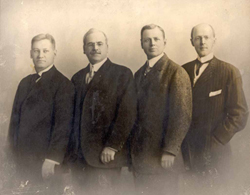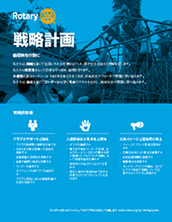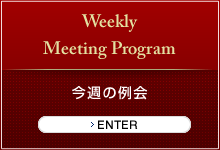About Rotary
Guiding principles
These principles have been developed over the years to provide Rotarians with a strong, common purpose and direction. They serve as a foundation for our relationships with each other and the action we take in the world.
Object of Rotary
The Object of Rotary is to encourage and foster the ideal of service as a basis of worthy enterprise and, in particular, to encourage and foster:
| FIRST | The development of acquaintance as an opportunity for service; |
|---|---|
| SECOND | High ethical standards in business and professions; the recognition of the worthiness of all useful occupations; and the dignifying of each Rotarian’s occupation as an opportunity to serve society; |
| THIRD | The application of the ideal of service in each Rotarian’s personal, business, and community life; |
| FOURTH | The advancement of international understanding, goodwill, and peace through a world fellowship of business and professional persons united in the ideal of service. |
History of Rotary International
 The first four Rotarians (from left): Gustavus Loehr, Silvester Schiele, Hiram Shorey, and Paul P. Harris, circa 1905-12.
The first four Rotarians (from left): Gustavus Loehr, Silvester Schiele, Hiram Shorey, and Paul P. Harris, circa 1905-12.
Paul P. Harris, an attorney, wanted to create a professional group with the same friendly spirit he felt in the small towns of his youth. On 23 February 1905, Harris, Gustavus Loehr, Silvester Schiele, and Hiram Shorey gathered at Loehr’s office in Room 711 of the Unity Building in downtown Chicago. This was the first Rotary club meeting. They decided to call the new club “Rotary” after the practice of rotating meeting locations.
Within five years clubs had formed across the country, from San Francisco to New York.
In August 1910, Rotarians held their first convention in Chicago. The 16 clubs that existed at that time united to form the National Association of Rotary Clubs.
In 1912, the name changed to International Association of Rotary Clubs to reflect the addition of clubs in other countries. The name Rotary International was adopted in 1922.
By July 1925, Rotary had grown to more than 2,000 clubs and an estimated 108,000 members on six continents.
Rotary’s reputation attracted presidents, prime ministers, and a host of other luminaries to its ranks — among them author Thomas Mann, diplomat Carlos P. Romulo, and composer Jean Sibelius.
As Rotary grew, members pooled their resources and used their talents to serve their communities. The organization's dedication to this ideal is best expressed in its motto: Service Above Self.
The Four-Way Test
The Four-Way Test is a nonpartisan and nonsectarian ethical guide for Rotarians to use for their personal and professional relationships. The test has been translated into more than 100 languages, and Rotarians recite it at club meetings:
Of the things we think, say or do
1.Is it the TRUTH?
2.Is it FAIR to all concerned?
3.Will it build GOODWILL and BETTER FRIENDSHIPS?
4.Will it be BENEFICIAL to all concerned?
Avenues of Service
We channel our commitment to service at home and abroad through five Avenues of Service, which are the foundation of club activity.
| 1 | Club Service focuses on making clubs strong. A thriving club is anchored by strong relationships and an active membership development plan. |
|---|---|
| 2 | Vocational Service calls on every Rotarian to work with integrity and contribute their expertise to the problems and needs of society. Learn more in An Introduction to Vocational Service and the Code of Conduct. |
| 3 | Community Service encourages every Rotarian to find ways to improve the quality of life for people in their communities and to serve the public interest. Learn more in Communities in Action: A Guide to Effective Projects and this Community Service presentation (PPT). |
| 4 | International Service exemplifies our global reach in promoting peace and understanding. We support this service avenue by sponsoring or volunteering on international projects, seeking partners abroad, and more. |
| 5 | Youth Service recognizes the importance of empowering youth and young professionals through leadership development programs such as Rotaract, Interact, Rotary Youth Leadership Awards, and Rotary Youth Exchange. |
Strategic plan
Rotary’s strategic plan provides the framework for our future, ensuring that we continue to be known as a respected, dynamic organization that advances communities worldwide.
The strategic plan evolves with the aspirations of Rotarians. It is shaped by regular input from members through surveys, focus groups, committees, and meetings, so it can continue to help us achieve our goals.
Our strategic priorities and goals
Rotary’s strategic plan identifies three strategic priorities supported by 16 goals. They represent what Rotarians have asked to be done to ensure a strong and vibrant Rotary going into the future.
Support and strengthen clubs
Foster club innovation and flexibility
- Encourage clubs to participate in a variety of service activities
- Promote membership diversity
- Improve member recruitment and retention
- Develop leaders
- Start new, dynamic clubs
- Encourage strategic planning at club and district levels
Focus and increase humanitarian service
- Eradicate polio
- Increase sustainable service focused on programs and activities that support youth and young leaders and Rotary's six areas of focus
- Increase collaboration with other organizations
- Create significant projects both locally and internationally
Enhance public image and awareness
- Unify image and brand awareness
- Publicize action-oriented service
- Promote core values
- Emphasize vocational service
- Encourage clubs to promote their networking opportunities and signature activities
Our mission
We provide service to others, promote integrity, and advance world understanding, goodwill, and peace through our fellowship of business, professional, and community leaders.
Our core values
Our values are an increasingly important component in strategic planning because they drive the intent and direction of the organization’s leadership.
These core values are:
Fellowship and global understanding
We build lifelong relationships.
Ethics and integrity
We honor our commitments.
Diversity
- We connect diverse perspectives.
- Vocational expertise, service, and leadership
- We apply our leadership and expertise to solve social issues












